2018 SkS Weekly Climate Change & Global Warming Digest #25
Posted on 24 June 2018 by John Hartz
Story of the Week... Toon of the Week... Quote of the Week... Reports of Note... Coming Soon on SkS... Climate Feedback Reviews... SkS Week in Review... Poster of the Week...
Story of the Week...
A Prophet of Doom Was Right About the Climate
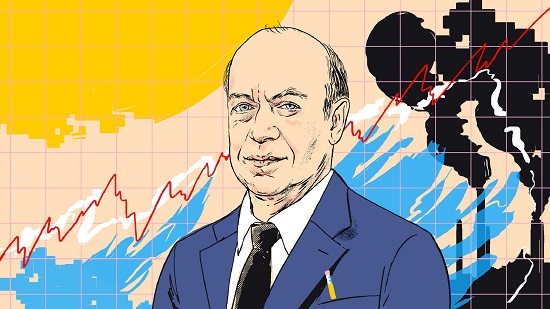
Credit: Agata Nowicka
The night before the day that would make him famous, James E. Hansen listened to a baseball game on the radio. But his mind kept wandering: What would he say to Congress the next day to convey that humans were endangering the planet?
He had long been trying to raise the alarm without success, and so had other scientists. But then, on June 23, 1988 — 30 years ago Saturday — a Colorado senator named Tim Wirth convened yet another hearing on the topic. Dr. Hansen was one of several scientists on the witness list.
Few people had ever heard of him, nor of the obscure NASA unit that he headed. He and a small group of colleagues studied the Earth’s climate, working in a suite of offices above the Manhattan diner that “Seinfeld” would later make famous.
He had conducted rigorous studies of historical temperatures, concluding that the planet was warming sharply. He had helped to pioneer computer modeling of the climate, and the results predicted further warming if people kept pouring greenhouse gases into the atmosphere.
A Prophet of Doom Was Right About the Climate, Opinion by Justin Gillis, Sunday Review, New York Times, June 23, 2018
Toon of the Week...
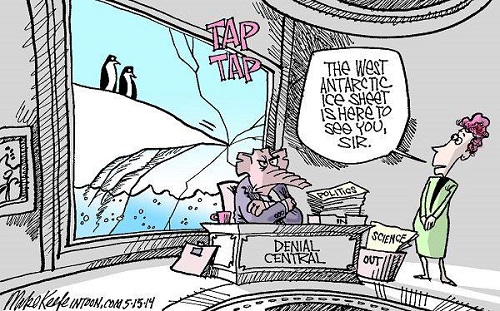
Quote of the Week...
Listening to James Hansen on Climate Change, Thirty Years Ago and Now
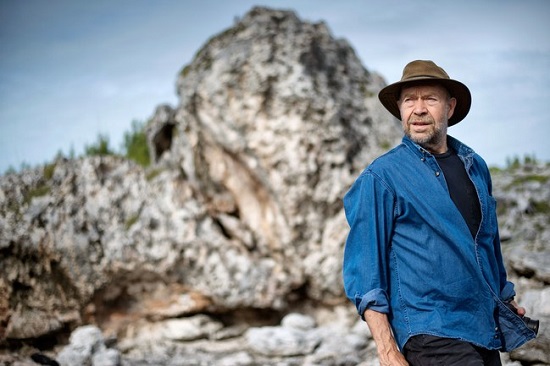
Photograph by Charles Ommanney / The Washington Post / Getty
Instead of using this anniversary to lament the failures of climate scientists, I’d like to propose that we use it to celebrate—well, “celebrate” probably isn’t quite the right word, but maybe recognize—their successes. Three decades ago, led by Hansen, they made a series of predictions; for the most part these have proved to be spectacularly accurate. That we, the general public, have failed to act on these predictions says a lot more about us than it does about them.
I happened to interview Hansen last year, for a video project. I asked him if he had a message for young people. “The simple thing is, I’m sorry we’re leaving such a fucking mess,” he said. Could the message be any clearer than that?
Listening to James Hansen on Climate Change, Thirty Years Ago and Now by Elizabeth Kolbert, The New Yorker Magazine, June 20, 2018
SkS Spotlights...
Global Forest Watch (GFW) is an online platform that provides data and tools for monitoring forests. By harnessing cutting-edge technology, GFW allows anyone to access near real-time information about where and how forests are changing around the world.
Reports of Note...
Underwater: Rising Seas, Chronic Floods, and the Implications for US Coastal Real Estate (2018)
Hundreds of thousands of homes are at risk of chronic flooding due to sea level rise over the coming decades. The implications for coastal residents, communities, and the economy are profound.
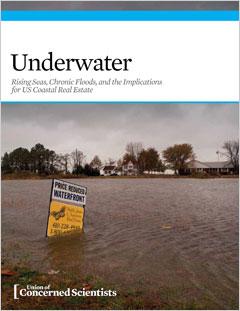
Sea levels are rising. Tides are inching higher. High-tide floods are becoming more frequent and reaching farther inland. And hundreds of US coastal communities will soon face chronic, disruptive flooding that directly affects people's homes, lives, and properties.
Yet property values in most coastal real estate markets do not currently reflect this risk. And most homeowners, communities, and investors are not aware of the financial losses they may soon face.
This analysis looks at what's at risk for US coastal real estate from sea level rise—and the challenges and choices we face now and in the decades to come.
Underwater: Rising Seas, Chronic Floods, and the Implications for US Coastal Real Estate (2018), Union of Concerned Scientists, June, 2018
Coming Soon on SkS...
- 30 years later, deniers are still lying about Hansen’s amazing global warming prediction (Dana)
- Explainer: How scientists estimate ‘climate sensitivity’ (Zeke Hausfather)
- What happened last time it was as warm as it’s going to get later this century? (Howard Lee)
- Republicans try to save their party with a carbon tax push (Dana)
- New research this week (Ari)
- 2018 SkS Weekly Climate Change & Global Warming News Roundup #26 (John Hartz)
- 2018 SkS Weekly Climate Change & Global Warming Digest #26 (John Hartz)
Climate Feedback Reviews...
Financial Post commentary misleads about warming effect of greenhouse gas emissions by cherry-picking studies
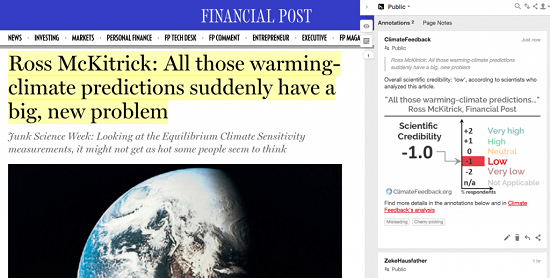
Climate Feedback asked a team of scientists to review the article, Ross McKitrick: All those warming-climate predictions suddenly have a big, new problem, Opinion by McKitrick, Financial Post, June 20, 2018
Five scientists analyzed the article and estimate its overall scientific credibility to be 'low'.
A majority of reviewers tagged the article as: Cherry-picking, Misleading.
Review Summary
This opinion published by the Financial Post, written by economist Ross McKitrick, claims that Earth’s climate is much less sensitive to additions of greenhouse gases like carbon dioxide than climate scientists think. The article further claims that global warming is, therefore, not an important problem—and may even be beneficial.
Scientists who reviewed the article found that this argument is misleading, and relies on ignoring all but a select few of the many studies that exist on this topic. These studies use a particular method for estimating this “equilibrium climate sensitivity” that other research has shown to be problematic. An informed opinion should consider all the scientific lines of evidence available instead of picking the ones that agree with the author’s predetermined conclusion. Taken together, that evidence does not support the article’s argument.
For a detailed summary of what we know about Earth’s equilibrium climate sensitivity, see this article at Carbon Brief.
Financial Post commentary misleads about warming effect of greenhouse gas emissions by cherry-picking studies, Edited by Emmanuel A Vincent, Climate Feedback, June 22, 2018
SkS Week in Review...
- 2018 SkS Weekly Climate Change & Global Warming News Roundup #25 by John Hartz
- New research, June 11-17, 2018 by Ari Jokimäki
- Video: Hansen’s Global Warming Prediction at 30. How did He Do? by greenman3610 (Climate Denial Crock of the Week by Peter Sinclair)
- Life after PhD by Kaitlin (ClimateSight)
- Wally Broeker: Father of “Global Warming”, in a Warning to his Granddaughter by greenman3610 (Columbia Earth Institute)
- Should we be worried about surging Antarctic ice melt and sea level rise? by Dana Nuccitelli (Climate Consensus - the 97%)
- 2018 SkS Weekly Climate Change & Global Warming Digest #24 by John Hartz
Poster of the Week...
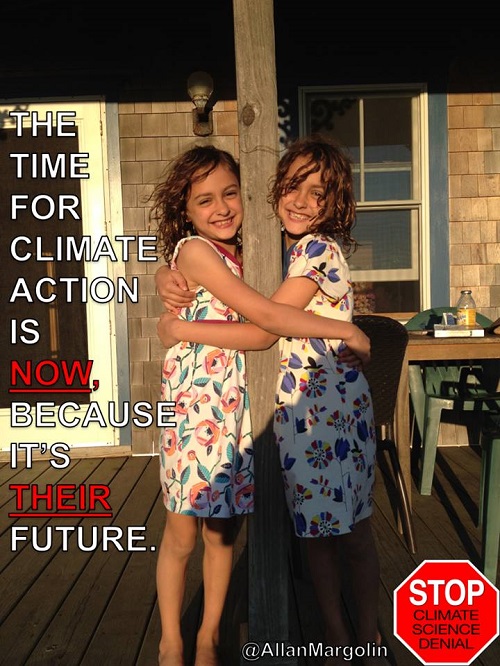































 Arguments
Arguments






























J Hansen deserves a medal for his work, and his tremendous commitment. His scenario B predictions have been well substantiated by real world temperatures, and are accurate enough to provide compelling evidence of the increasing greenhouse effect. He himself thought scenario B level emissions was the most likely. It disgusts me the way people try and falsely distort his predictions, to make them look as weak as possible.
Fossil fuel interests and libertarian ideologies have indeed dominated and influenced politics and have combined with a strongly emergent and destructive, vicious tribalism. At this rate America will divide into two separate warring countries, the red states and the blue states.
The ranked choice voting system is compelling, and sounds similar to the single transferable vote system which is used in the Australian Senate, Ireland and Canada. NZ has mixed member proportional representation, which has lead to less partisan divisions and extremes of policy than America, but it can sometimes lead to very small parties having excessive power. STV is a more optimal system, but takes some effort to get your head around it.
It seems to me like confrontational party political systems are all rather old fashioned and from a time when there was a huge and legitimate battle for workers basic rights. Surely we have moved beyond this? We should be electing parties less on partisan ideology and gut instincts, and more like a board of directors, so parties who have the best qualified people, and a rich diversity of ideas and a real commitment to everyone. Thats all you really need.
The other problem is money in politics. Wealthy campaign donors, business groups and lobby groups have disproportionate influence. These various sources of influence do not balance out, and imho it looks like extremists particulary of business interests and wealthy libertarian ideologues dominate. The public good is not given proper representation, so the system is flawed.
Campaign spending should be funded out of taxes, and it would cost nothing in the greater scheme of things, or at least it should be capped. There's nothing in Americas Constitution that forbids this. The first amendment has been invoked to justify private funding of election campaigns, but this seems absurd to me. But the bottom line is the entire political system and its methods of funding is obviously broken, and this is being ignored.
Thank you. You make it very dificult to add a commenbt. I wish to comment on the article by Dana Luccatelli in the 9 July issue, which insults me ad hominem. Mostly I agree with his views, but in this case they are based on ignorance and lack of experience of Arctic science. I am accused of being an alarmist because I predicted an early end to the summer Arctic ice. Well, that is very likely to happen this year, and if not this year in the next couple of years, as opposed to the second half of the century as proposed by distinguished Governmental modellers such as
Dame Julia Slingo of the Met Office. Is it being alarmist to be a couple of years out? Or is it being complacent to be 40 years out like most modellers? I suggest that Dana reads my book "A Farewell to Ice" (UK Penguin, US Oxford Univ Press) and even considers recommending it to his readers. That way he could do some good. And I would like to make him a little wager - if the summer ice is gone by 2020 he might consider apologising for calling me an alarmist. If not - then let him continue with his troll act. Best wishes Peter Wadhams
PWadhams @2,
I'm not sure why you are having problems commenting on the 'There are genuine climate alarmists, but they're not in the same league as deniers' thread. The process is identical to that required to comment here.
I have thus responded to the substance of your comment on that thread.